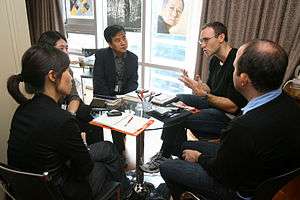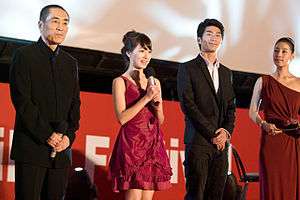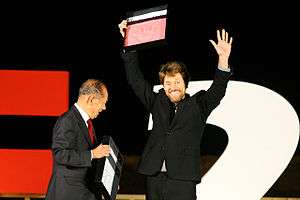
Busan Cinema Center
The Busan International Film Festival (BIFF, previously Pusan International Film Festival, PIFF), held annually in Haeundae-gu, Busan (also Pusan), South Korea, is one of the most significant film festivals in Asia.[1] The first festival, held from 13 to 21 September 1996, was also the first international film festival in Korea. The focus of the BIFF is introducing new films and first-time directors, especially those from Asian countries. Another notable feature is the appeal of the festival to young people, both in terms of the large youthful audience it attracts and through its efforts to develop and promote young talent. In 1999, the Pusan Promotion Plan (renamed Asian Project Market in 2011) was established to connect new directors to funding sources. The 16th BIFF in 2011 saw the festival move to a new permanent home, the Busan Cinema Center in Centum City. The Busan Cinema Center is an about USD 150 million structure designed by Austria-based architecture collective Coop Himmelblau. The about 30,000 m² Cinema Center includes a 4,000-seat outdoor theatre; four indoor screens under an LED-covered roof; media centre; archive space; and conference rooms; allowing the festival to include industry forums and educational activities.[2]
[3]
History
- 1st Busan International Film Festival, 13–21 September 1996
- Films screened: 173 films from 31 countries
- Opening Film: Secrets & Lies, Mike Leigh, UK/France
- Closing Film: In Expectation, Ming Zhang, China
- Participating guests: 224 guests from 27 countries
- Total audience: 184,071
- 2nd Busan International Film Festival, 10–18 October 1997
- Films screened: 163 films from 33 countries
- Opening Film: Chinese Box, Wayne Wang, UK/France/USA/Japan
- Closing Film: Eighteen Springs, Ann Hui, Hong Kong-China
- Participating guests: 450 guests from 30 countries
- Total audience: 170,206
- 3rd Busan International Film Festival, 24 September – 1 October 1998
- Films screened: 211 films from 41 countries
- Opening Film: The Silence, Mohsen Makhmalbaf, Iran/France
- Closing Film: Kanzo sensei, Shohei Imamura, Japan
- Participating guests: 659 guests from 25 countries
- Total audience: 192,547 (paid audiences: 174,870)
- 4th Busan International Film Festival, 14–23 October 1999
- Films screened: 207 films from 53 countries
- Opening Film: Peppermint Candy, Lee Chang-Dong, Korea
- Closing Film: Not One Less, Zhang Yimou, China
- Participating guests: 555 guests from 36 countries
- Total audience: 180,914
- 5th Busan International Film Festival, 6–14 October 2000
- Films screened: 207 films from 55 countries
- Opening Film: The Wrestlers, Buddhadeb Dasgupta, India
- Closing Film: In the Mood for Love, Wong Kar-wai, Hong Kong-China
- Participating guests: 3017 guests from 39 countries
- Total audience: 181,708 people
- 6th Busan International Film Festival, 9–17 November 2001
- Films screened: 201 films from 60 countries
- Opening Film: The Last Witness, Bae Chang-ho, Korea
- Closing Film: The Legend of Suriyothai, Chatrichalerm Yukol, Thailand
- Participating guests: 3,761 guests from 30 countries
- Total audience: 143,103 people
- 7th Busan International Film Festival, 11–23 November 2002
- Films screened: 226 films from 55 countries
- Opening Film: The Coast Guard, Kim Ki-duk, Korea
- Closing Film: Dolls, Kitano Takeshi, Japan
- Participating guests: 2,002 guests from 35 countries
- Total audience: 167,349 people
- 8th Busan International Film Festival, 2–10 October 2003
- Films screened: 243 works from 61 countries
- Opening Film: Doppelganger, Kiyoshi Kurosawa, Japan
- Closing Film: Acacia, Park Ki-hyung, Korea
- Participating guests: 2,523 people from 44 countries
- Total audience: 165,102
- 9th Busan International Film Festival, 7–15 October 2004
- Films screened: Total 262 films from 63 countries
- Opening Film: 2046, Wong Kar-wai, Hong Kong-China
- Closing Film: The Scarlet Letter, Daniel H. Byun, Korea
- Participating guests: Total 5,638 guests from 50 countries
- Total audience: 166,164
- 10th Busan International Film Festival, 6–14 October 2005
- Films screened: 307 films from 73 countries
- Opening Film: Three Times, Hou Hsiao-Hsien, Taiwan
- Closing Film: Wedding Campaign, Hwang Byung-kook, Korea
- Participating guests: 6,088 from 55 countries
- Total audience: 192,970
- 11th Busan International Film Festival, 12–20 October 2006
- Films screened: 245 films from 63 countries
- Opening Film: Traces of Love, Kim Dae-seung, Korea
- Closing Film: Crazy Stone, Ning Hao, China/Hong Kong-China
- Participating guests: 8,321 from 51 countries
- Total audience: 162,835
- 12th Busan International Film Festival, 4–12 October 2007
- Films Screened: 271 films from 64 countries in 770 screenings
- Opening Film: Assembly, Feng Xiaogang, China
- Closing Film: Evangelion 1.0: You Are (Not) Alone, Kazuya Tsurumaki, Hideaki Anno, Masayuki, Japan
- Participating guests: 7,361
- Total audience: 198,603
- 13th Busan International Film Festival, 2–10 October 2008
- Films screened: 315 films from 60 countries
- Opening Film: The Gift to Stalin, Rustem Abdrashev, Russia/Kazakhstan/Israel/Poland
- Closing Film: I Am Happy, Yoon Jong-chan, Korea
- Participating guests: 9,516
- Total audience: 198,818
- 14th Busan International Film Festival, 8–16 October 2009
- Films Screened: 355 films from 70 countries. 803 screenings.
- Opening Film: Good Morning President, Jang Jin, Korea
- Closing Film: The Message, Gao Qunshu, Chen Kuo-fu, China
- Participating guests: 6,400
- Total audience: 173,516
- Films Screened: 306 films from 67 countries
- Opening Film: Under the Hawthorn Tree, Zhang Yimou, China
- Closing Film: Camellia, Wisit Sasanatieng, Isao Yukisada, Jang Joon-hwan, Thailand/Japan/Korea
- Participating guests: 9,367
- Total audience: 182,046
- Films Screened: 307 films from 70 countries[4]
- Opening Film: Always, Song Il-gon, South Korea
- Closing Film: Chronicle of My Mother, Masato Harada, Japan
- Participating guests: 11,268, including the press 2,440[4]
- Total audience: 196,177[4]
- Films Screened: 304 films from 75 countries
- Opening Film: Cold War, Longman Leung, Sunny Luk, Hong Kong
- Closing Film: Television, Mostofa Sarwar Farooki, Bangladesh
- Participating guests: 11,519, including the press 2,357
- Total audience: 221,002
- Films Screened: 299 films from 70 countries
- Opening Film: Vara: A Blessing, Khyentse Norbu, Bhutan
- Closing Film: The Dinner, Kim Dong-hyun, Korea
- Participating guests: 9,991, including the press 2,262
- Total audience: 217,865
- Films Screened: 312 from 79 countries
- Opening Film: Paradise in Service, Doze Niu, Taiwan
- Closing Film: Gangster Payday, Lee Po-cheung, Hong Kong
- Participating guests: 10,173, including the press 2,291
- Total audience: 226,473
- Films Screened: 302 from 75 countries
- Opening Film: Zubaan, Mozez Singh, India
- Closing Film: Mountain Cry, Larry Yang, China/United States
- Participating guests: 9,685, including the press 2,325
- Total audience: 227,377
Official Program Sections
The Busan International Film Festival is organised in various sections:
- Gala Presentation: Gala Presentation screens new master cineastes, the year's most-talked-about films, and world/international premieres.
- A Window on Asian Cinema: A showcase of brand new and/or representative films by the talented Asian filmmakers with their diverse points of view and style.
- New Currents: The only international competition section featuring the first or the second feature films by the future leading directors of Asian cinema.
- Korean Cinema Today: Selected Korean feature films are shown in two sub-sections, Panorama and Vision. These two sub-sections recognise the current production trend of Korean cinema and anticipate its future.
- Korean Cinema Retrospective: Revisiting the history of Korean cinema by spotlighting films of a certain notable director or films with a significant theme.
- World Cinema: Presentation of new works by world-renowned filmmakers along with the year's best films that help understanding the recent trends in world cinema.
- Wide Angle: A section dedicated to showing outstanding short films, animation, documentaries, and experimental films presenting different and distinct vision via broader cinematic viewpoints.
- Open Cinema: A unique outdoor screening venue where a collection of new films, combining both art and mass popularity, are shown along with internationally acclaimed works.
- Flash Forward: Flash Forward is set to discover yet-surfaced cineastes and create buzz among the young film generation. This section is an eclectic collection of first or second films of up-and-coming filmmakers from non-Asian countries.
- Midnight Passion: Midnight Passion presents films of diverse genres selected for entertainment value from all over the world to meet the audience at night.
- Special Programs in Focus: A retrospective and special showcase of films of a certain notable director or genre.
Official Divisions

Asian Film Market

PPP(Pusan Promotion Plan) meeting
- Asian Film Market: Launched in 2006 as a comprehensive marketplace for the array of industry events at the Busan International Film Festival, the Asian Film Market laid down its cornerstone as the new hub of the Asian film industry, organisations and institutes participating from around the world.
- Asian Project Market (former PPP: Pusan Promotion Plan) is a pre-market where promising filmmakers and producers can meet with potential co-producers and financiers and, in turn, investors and co-producers can find a diverse selection of the latest (Asian) projects of top quality. As a dynamic project market focused in Asian cinema, APM has brought together viable programmes and projects to entice and meet participating film professionals from all over the world for last 11 years.
- Asian Cinema Fund: The Asian Cinema Fund is a funding program to help activate more independent film productions and to set up a stable production environment. It supports projects in various stages and categories, from script development and post-production to documentary films to discover hidden jewels from future talents. ACF also aims to be a cornerstone in the foundation of a pan-Asian network by providing a meeting place for Asian filmmakers. The 900 million won (approximately 900,000USD) Asian Cinema Fund will be used to provide support to seven projects in script development, five post-productions, and thirteen documentary films.
- The Script Development Fund is aimed at helping screenwriters complete their scripts. It will offer an opportunity to make for a more creative and fine-tuned project.
- The Post-Production Fund is made possible through the enthusiastic support of Korean post-production companies and the Korean Film Council. With this fund, the director is invited to Korea to work on sound and DI with Korean post-production houses. It will help the director complete his or her film in 35mm. With the Post-Production Fund, top-notch technicians from Korean companies will help the project along to a higher level of quality. Furthermore, this fund is expected to be the basis for an Asian network of filmmaking technology.
- The Asian Network of Documentary Fund was initiated in 2002 and sponsored by six universities and corporations in the Busan region. As a part of the Busan International Film Festival, and holds master classes and clinics to stabilise the environment for documentary productions. It is becoming an important ground for establishing a network for Asian documentaries by helping selected documentaries to be presented at many different showcases from various regions around the world. The Asian Cinema Fund helps Asian filmmakers realise their visions. It is designed to offer essential and tangible contributions in taking Asian cinema to the next level.
- Asian Film Academy (AFA) is an educational program where prospective filmmakers and established directors from Asia gather to deliberate and prepare for the future of Asian cinema. Fellows of AFA will share the vision of Asian cinema with prominent filmmakers through its 17 days of program.

Asian Film Academy
- Busan Cinema Forum (BCF) is an academic event for filmmakers and scholars, launched on 10 October 2011.[7] It aims to enhance the knowledge and support of the film industry and film aesthetics.
Awards
A number of awards are handed out each year, including:
New Currents Award
The New Currents Award is given to best feature films selected from works of new Asian Directors in the New Currents section.
Flash Forward Award
Newly created in 2009, the USD 30,000 award is given to the best film among those screened in the competing section, Flash Forward.
Sonje Award
A KRW 20,000,000 (US$17,000) award given to the Korean and Asian director of the best short film (1996, 1997, 2008–present).
| No. |
Year |
Film |
Director |
Country |
| 1 | 1996 | Arrival of the Train | Andrej Sheleznjakov | Russia |
| 2 | 1997 | The Saltmen of Tibet | Ulrike Koch | Switzerland |
| 3 | 1998 | Lachrymal | Lim Chang-jae | South Korea |
| Heavy | Park Chan-ok | South Korea |
| 4 | 1999 | 28 October 1979, A Sunny Sunday | Kwon Jong-kwan | South Korea |
| 5 | 2000 | Bardo | Yoon Young-ho | South Korea |
| 6 | 2001 | Siam Hard Romance | Kim Jeong-gu | South Korea |
| 7 | 2002 | Chapter Two: How to Breathe | Lee Hyung-suk | South Korea |
| 8 | 2003 | The Spring and the Delight | Park Jung-seon | South Korea |
| The Third Tongue | Son Kwang-ju | South Korea |
| 9 | 2004 | Punk Eek | Son Kwang-ju | South Korea |
| Gold Fish | Park Shin-woo | South Korea |
| 10 | 2005 | Tea & Poison | Joung Yong-ju | South Korea |
| A Bowl of Tea | Kim Young-nam | South Korea |
| 11 | 2006 | Portfolio | Yoon Seong-ho | South Korea |
| The Wind Stirs | Lee Jin-woo | South Korea |
| 12 | 2007 | Woong's Story | Lee Ha-song | South Korea |
| A Man Under the Influenza | Jung July | South Korea |
| 13 | 2008 | Andong | Rommel Tolentino | Philippines |
| Girl | Hong Sung-hoon | South Korea |
| 14 | 2009 | Somewhere Unreached | Kim Jae-won | South Korea |
| Rare Fish | Basil Mironer | Singapore/Indonesia |
| 15 | 2010 | Broken Night | Yang Hyo-joo | South Korea |
| Inhalation | Edmund Yeo | Malaysia/Japan |
| 16 | 2011 | See You Tomorrow | Lee Woo-jung | South Korea |
| Thug Beram | Venkat Amudhan | India |
| 17 | 2012 | The Night of The Witness | Park Buem | South Korea |
| A Little Farther | Nikan Nezami | Iran |
| 18 | 2013 | A Lady Caddy Who Never Saw a Hole in One | Yosep Anggi Noen | Indonesia |
| In the Summer | Son Tae-gyum | South Korea |
| 19 | 2014 | Stairway | Matt Wu | Taiwan |
| The Night | Choi Ki-yun | South Korea |
| 20 | 2015 | Nia's Door | Lau Kek Huat | Taiwan |
| Shame Diary | Lee Eun-jeong | South Korea |
BIFF Mecenat Award
A KRW 10,000,000 (US$8,500) award given to the best Korean and Asian (from 2008) documentary film directors.
| No. |
Year |
Film |
Director |
Country |
| 1 | 1996 | Wind Echoing in My Being | Jeon Soo-il | South Korea |
| 2 | 1997 | The Six Day Fight in Myong Dong Cathedral | Kim Dong-won | South Korea |
| 3 | 1998 | Reclaiming Our Names | Hong Hyung-sook | South Korea |
| 4 | 1999 | My Own Breathing | Byun Young-joo | South Korea |
| Mindullae | Choi Ha Dong-ha, Lee Jeong-soon | South Korea |
| 5 | 2000 | Sky-Blue Hometown | Kim So-young | South Korea |
| 6 | 2001 | Farewell | Hwang Yun | South Korea |
| 7 | 2002 | On the Right Track | Lee Ji-young | South Korea |
| Mudang: Reconciliation Between the Living and the Dead | Park Ki-bok | South Korea |
| 8 | 2003 | And Thereafter | Lee Ho-sup | South Korea |
| 9 | 2004 | What Do People Live For? | Lee Jeong-soon | South Korea |
| 10 | 2005 | Coreen 2495 | Ha Joon-so | South Korea |
| Annyoung Sayonara | Kim Tae-il, Kumiko Katō | South Korea |
| 11 | 2006 | Our School | Kim Myeong-joon | South Korea |
| People Crossing the River | Kim Duk-chul | South Korea |
| 12 | 2007 | Grandmother's Flower | Moon Jung-hyun | South Korea |
| 13 | 2008 | Mental | Kazuhiro Soda | Japan |
| Old Partner | Lee Chung-ryoul | South Korea |
| 14 | 2009 | Earth's Woman | Kwon Woo-jung | South Korea |
| The Other Song | Saba Dewan | India |
| 15 | 2010 | Miracle on Jongno Street | Lee Hyuk-sang | South Korea |
| New Castle | Guo Hengqi | China |
| 16 | 2011 | Sea of Butterfly | Park Bae-il | South Korea |
| Shoji & Takao | Ide Yoko | Japan |
| 17 | 2012 | Anxiety | Min Hwan-ki | South Korea |
| Embers | Tamara Stepanyan | Lebanon/Qatar/Armenia |
| 18 | 2013 | Jalanan ("Streetside") | Daniel Ziv | Indonesia |
| Non-fiction Diary | Jung Yoon-suk | South Korea |
| 19 | 2014 | Collapse | Mun Jeong-hyun, Lee Won-woo | South Korea |
| The Storm Makers | Guillaume Suon | Cambodia |
| 20 | 2015 | Boys Run | Kang Seok-pil | South Korea |
| Look Love | Ye Yun | China |
Actor & Actress of the Year Award
Newly created in 2014, Actor & Actress of the Year is the award to focus on first time actor and an actress in an independent Korean film among the New Currents and Korean Cinema Today Vision section. One top Korean actor and actress select one actor and one actress, will be awarded at the closing ceremony. Winners will be awarded 5,000,000 KRW (approx. 5,000 USD) each.
| No. |
Year |
Actor |
Film |
Country |
Actress |
Film |
Country |
| 19 | 2014 | Choi Woo-shik | Set Me Free | South Korea |
Cho Soo-hyang | Wild Flowers | South Korea |
| 20 | 2015 | Lee Ju-won | ALONE | South Korea |
Sun Jang | Communication & Lies | South Korea |
FIPRESCI Award
Given by the International Federation of Film Critics from the entries in the New Currents section.
NETPAC Award
Awarded to the best Korean film from either New Currents and Korean Cinema Today sections
Busan Cinephile Award
This award is given to the best world documentary film presented in the Wide Angle Documentary Showcase. The winner is awarded 5,000,000KRW (approx. 5,000 USD). The jury consists of college students, including 70 students from the cinema-related departments of 7 universities in Busan region.
DGK Award
DGK Award goes to two most outstanding Korean films from Korean Cinema Today-Vision section with grant of KRW 5,000,000(approx. USD 5,000) for each winner, which is sponsored by MEGABOX.
| No. |
Year |
Film |
Director |
Country |
| 19 | 2014 | A Midsummer's Fantasia | Jang Kun-jae | South Korea |
| Socialphobia | Hong Seok-jae | South Korea |
| 20 | 2015 | The Boys Who Cried Wolf (aka The Shepherd) | Kim Jin-hwang | South Korea |
| Eyelids | O Muel | South Korea |
Daemyung Culture Wave Award
Newly created in 2014, it is co-sponsored by Daemyung Holdings to expand the opportunity of the Korean independent films, it is established to award the film from the Korean Cinema Today-Vision and New Currents with prized of 20,000,000 KRW (approx. 20,000 USD) and distribution support.
| No. |
Year |
Film |
Director |
Country |
| 19 | 2014 | The Liar | Kim Dong-myung | South Korea |
| 20 | 2015 | Overman | Seo Eun-young | South Korea |
CGV Movie Collage Award
This award was newly created in 2011 in collaboration with CJ CGV Arthouse to shed new light on the Korean Cinema Today Vision section. The award aims to provide independent films, indie films, new films, and low budget films with distribution and screening opportunities.
KNN Award (Audience Award)
Awarded by the KNN Foundation to a film from the New Currents section selected by audiences with a $20,000 award for the director.
Busan Bank Award (Audience Award)
Created in 2013, this award is given to the film that is most highly rated by festival audiences. Approximately 10 films from the Flash Forward section are selected beforehand to participate in this competition. A total of 20,000 USD is granted by the BNK Busan Bank. 10,000 USD is awarded to the director and the other half is used to support the distribution of the film in Korea.
| No. |
Year |
Film |
Director |
Country |
| 18 | 2013 | Home | Maximilian Hult | Sweden/Iceland |
| 19 | 2014 | The Boss, Anatomy of a Crime | Sebastián Schindel | Argentina |
| 20 | 2015 | Highway to Hellas | Aron Lehmann | Germany |
Citizen Critics’ Award
Citizen critics from the Busan Cinematheque choose the best film from those screened in the Korean Cinema Today-Vision section and its director is granted the award. The winner is awarded 10,000,000 KRW (approx. 10,000 USD) with the purpose of assisting in their next production.
Korean Cinema Award
Given to individuals who have made outstanding contributions in promoting Korean Cinema to the World Film Community.
| No. |
Year |
Name |
Country |
| 1 | 1996 | Adriano Apra | Italy |
| Tony Rayns | UK |
| Alain Jalladeau | France |
| Ulrich Gregor | Germany |
| Larry Kadish | USA |
| Ancha Flubacher-Rhim | Switzerland |
| Simon Field | UK |
| 2 | 1997 | Aruna Vasudev | India |
| Sato Tadao | Japan |
| 3 | 1998 | Gilles Jacob | France |
| Moritz de Hadeln | Germany |
| 4 | 1999 | Serge Losique | Canada |
| Lee Young-il | South Korea |
| 5 | 2000 | Martin & Anna Louisa Girod | Switzerland |
| 6 | 2001 | Eva Zaoralová | Czech Republic |
| 7 | 2002 | Alain Patel | France |
| 8 | 2003 | Park Byoung-yang | Japan |
| Lee Bong-ou | Japan |
| 9 | 2004 | Yano Kazuyki | Japan |
| Phillip Cheah | Singapore |
| 10 | 2005 | Dieter Kosslick | Germany |
| Thierry Fremaux | France |
| 11 | 2006 | Martial Knaebell | Switzerland |
| Terawaki Ken | Japan |
| 12 | 2007 | Sabrina Baracetti | Italy |
| Jean-Francois Rauger | France |
| 13 | 2008 | Richard Pena | USA |
| 14 | 2009 | Riccardo Gelli | Italy |
| Jeannette Paulson Hereniko | USA |
| 15 | 2010 | Bruno Barde | France |
| 16 | 2011 | Julietta Sichel | Czech Republic |
| 17 | 2012 | Hayashi Kanako | Japan |
| 18 | 2013 | Charles Tesson | France |
| 19 | 2014 | Corinne Siegrist-Oboussier | Switzerland |
| 20 | 2015 | Wieland Speck | German |
Asian Filmmaker of the Year

Tsai Ming-liang, Asian Filmmaker of the Year, Pusan International Film Festival 2010
Given to an Asian filmmaker with the most outstanding activity in improving and developing Asian Film Industry and Culture.
See also
References
External links
|
|---|
| Feature
(Competitive) | |
|---|
| Feature
(Competitive Specialised) | |
|---|
| Feature
(Non-competitive) | |
|---|
| | Documentary and Short | |
|---|
|
|
|---|
| | | | Modern | |
|---|
| | Traditional | |
|---|
| | Arts | |
|---|
| | See also | |
|---|
| |
|










